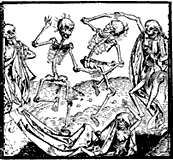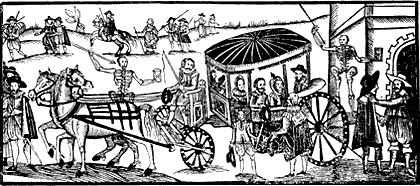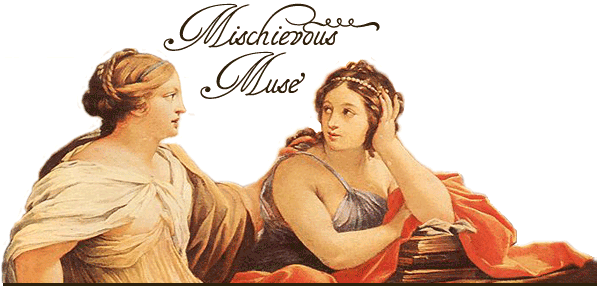The Tudors, Episode 7 - Enter the Plague
 What a fabulous episode this last episode of Showtime's "The Tudors" was... after episodes of soap opera and romancing in Tudor gardens, galleys, and four-posters, the "sweating sickness" ravages first the countryside, then London itself.
What a fabulous episode this last episode of Showtime's "The Tudors" was... after episodes of soap opera and romancing in Tudor gardens, galleys, and four-posters, the "sweating sickness" ravages first the countryside, then London itself. [[A thing to note here, the "sweating sickness" was a different disease from what we now call the plague (i.e., the Bubonic plague, which struck England first in 1348 with occasional comebacks); but the various virulent epidemics which hit England in the Middle Ages and Renaissance were commonly all called "plagues" by the populace.]]
Henry VIII was notoriously frightened of sickness in general, the sweating sickness in particular — with good reason. The outbreaks could kill thousands of people in a matter of days. I delighted in the scene where Henry opens the royal medicine cabinet and introduces the supposed cure-alls and preventatives against sickness. This is the kind of detail that makes the show superb.
Latimer tells the King, in his opinion the cures are of little worth, but suggests exercise; Wolsey, who has just dispatched Gardiner and Fox to Pope Clement VII, tries to ward of the sickness by eating oranges. Not a bad idea, actually; vitamin- C can at least boost one's immune system.

Queen Catherine is sent to Wales to be with the Princess Mary, Anne Boleyn to her father's Hever Castle, while Henry stays in the palace with a bare minimum of servants. Sir Thomas More gathers his family around for prayer and tells them the plague is sent upon them by God, because of a greater sickness sweeping Europe — Lutheranism.
The mis-en-scene is staggering in its authenticity and effectiveness. The palace without its bright lights and courtiers fluttering about like butterflies seems like a living tomb; a gorgeous aerial view of London, all dark save for plague fires burning, cries of "Bring out your dead" piercing the silence... it is eerie and effective. The gravediggers digging a large grave with old skulls and arm bones cannot help but put one in mind of "Alas, poor Yorick!"
 Anne and Wolsey both catch the sickness, but pull through. The King's friend, Compton, is not so lucky. After the sickness passes, the court gathers to hear a mass for the dead, and the audience is treated to a heartbreakingly beautiful composition by Thomas Tallis, sung by the little choirboys of Paul's.
Anne and Wolsey both catch the sickness, but pull through. The King's friend, Compton, is not so lucky. After the sickness passes, the court gathers to hear a mass for the dead, and the audience is treated to a heartbreakingly beautiful composition by Thomas Tallis, sung by the little choirboys of Paul's. I ask you, does it get any better than this? Every week I wait for the second the next episode becomes available. I need to own this when they finally sell it.
I ask you, does it get any better than this? Every week I wait for the second the next episode becomes available. I need to own this when they finally sell it.Labels: Plague, Renaissance, Tudors, TV





3 Comments:
I wonder if they put so much into one single episode how detailed and faithful could that be - I mean can an episode this thick give you a historical feeling? a feeling that you seem to take part in the events yourself - or does it come out rather like a documentary, a summary?
I wonder how such a rich material can be made into a sequel? How much is lost, how much comes through?
They really manage to fill the episodes with detail, without making it feel like a documentary. I think the strong narrative thread and actors carry it off so that it's easy to feel absorbed both in the story and the history.
than it really must be a treat, especially for you!
Post a Comment
<< Home